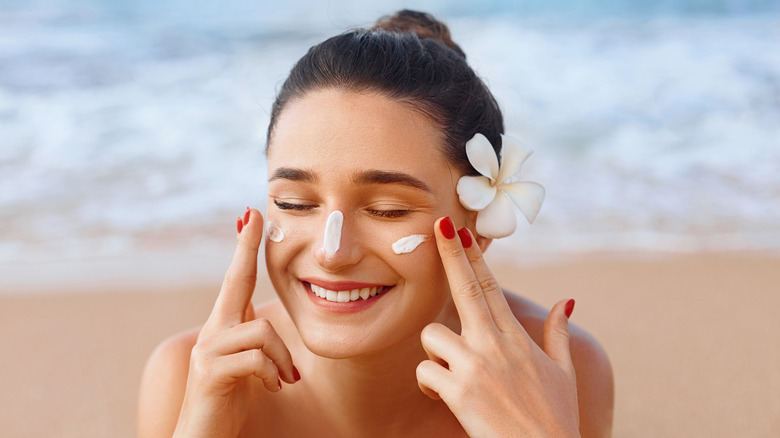Mineral Vs. Chemical Sunscreen: Which Is Better For Dry Skin?
In 2021, it's no secret that sunscreen is a key product for your daily skincare routine, especially when it comes to anti-aging and preventing cancer from the sun's harmful UV rays (just ask any dermatologist). If you're doing things right, you'll be wearing it on your face everyday at a minimum SPF of 30 (via Allure). However, many people may not know that there are two main types of sunscreen: mineral (often called physical) and chemical. Basically, the difference between the two is that while mineral sunscreens sit on top of the skin to reflect UV rays, chemical sunscreens absorb these rays, turn them into heat, and release this heat from the skin (via Byrdie).
Although both types work effectively, deciding between a mineral and chemical sunscreen can be somewhat tricky, especially when skin types come into play. If you have dry skin, you may be wondering what type of sunscreen best suits your needs. Luckily, we're here to help. Keep scrolling to find out if a mineral or chemical sunscreen is better for dry skin.
If you have dry skin, mineral sunscreens are the way to go
A key difference to note about mineral and chemical sunscreens is that while mineral sunscreens work immediately upon application, chemical sunscreens need at least 15 minutes before they can start effectively blocking UV rays. Mineral sunscreens also need more frequent applications throughout the day, and contain an ingredient called zinc oxide which often leaves a white cast on the skin (however, newer formulations are getting better about this). On the other hand, chemical sunscreens are less likely to leave this cast, and tend to be thinner in texture in general and are therefore more optimal for everyday use.
Overall, mineral sunscreens tend to be thicker in consistency and often have moisturizing properties, which makes them more ideal for those with dry skin, according to travel and beauty lifestyle editor Lindsay Silberman. According to The Derm Review, zinc oxide is a hydrating ingredient that prevents water loss from the skin, and is typically only found in mineral sunscreens as opposed to chemical. The thick consistency of mineral sunscreens may not offer an optimal experience for those with oily skin, which means dry skin owners are the ones who should opt for a trusty physical sunscreen product.

